|
At a time when there seem to be enough possessed house movies to threaten vampire and zombie flicks for horror sub-genre dominance, it's easy to forget that in years past, house hauntings rarely made for genuinely scary cinema. Lewis Allen's 1944 The Uninvited, Jack Clayton's 1961 The Innocents and Robert's Wise's terrifying 1966 The Haunting are now all acknowledged classics, and I'll happily champion John Hough's The Legend of Hell House, a thunderously effective 1973 paranormal investigation movie from the pen of genre master Richard Matheson. But following the redefinition of cinematic horror that was The Exorcist, such movies quickly fell out of favour as a big screen experience and found themselves relegated to the small screen as made-for-TV chillers, some of which were actually pretty damned good.
One filmmaker who thrived in this potentially more restrictive and censorial environment was director Dan Curtis, whose TV movie The Night Stalker and Dark Shadows series remain firm fan favourites over 30 years after they were first screened. Then in 1976 he and writer William F. Nolan, with whom he had collaborated on The Norliss Tapes, Melvin Purvis G-MAN, Trilogy of Terror and Sky Heist (all for TV), struck a deal to bring Robert Marasco's 1973 horror novel Burnt Offerings to the big screen, having run up against a wall in their attempt to do so a couple of years earlier. That delay may have been crucial. Critical reception was less than enthusiastic, the general opinion being that haunted house horror's time had now been supplanted by The Devil and more set-piece driven narratives. In the post-Exorcist world, such films were deemed old-fashioned and even a little quaint. But despite surface impressions to the contrary, Burnt Offerings was not your standard haunted house film, and while not as bombastic in execution as some of its genre contemporaries or the possessed house revival of recent years, it is, in its way, a thoughtful and unsettling work that has over time built a small but enthusiastic cult following.
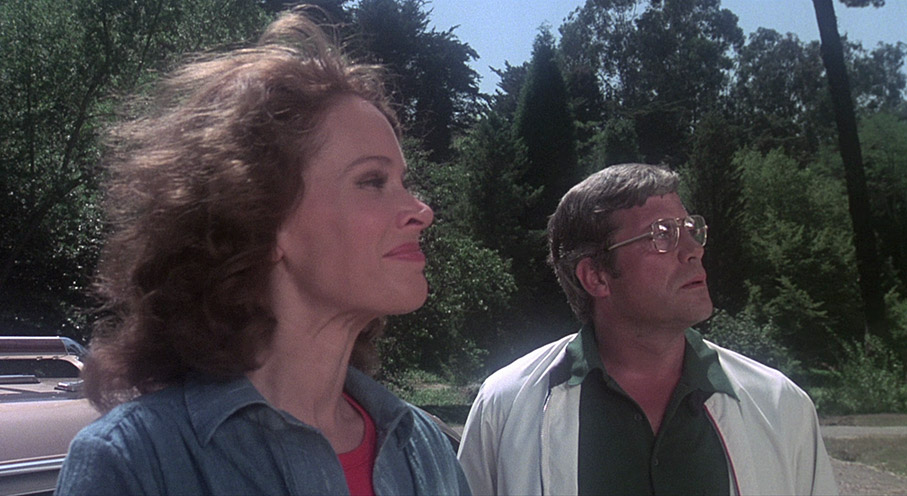
Ben and Marian Rolf, together with their 12-year-old son Davey and Ben's ageing Aunt Elizabeth, secure the summer rental on a spacious country mansion from sibling owners Roz and Arnold Allardyce for what seems like a too-good to be true price. There's just one proviso, that they prepare meals for the Allardyces' elderly mother, who lives a reclusive existence in a suite of rooms at the top of the house and will otherwise require no attention from them. Ben has reservations, but Marian has taken a shine to the property and agrees to attend to the task herself, and the deal is struck.
Having moved in, the Rolf family quickly takes to the house – Aunt Elizabeth relaxes with her painting, Marian busies herself sprucing up the interior, and Ben and Davey work to revive the empty and abandoned swimming pool. But as you would expect, right from the off something's not quite right here. For the first week of their stay, the unseen Mrs. Allardyce barely touches her meals and fails to respond to Marian's verbal enquiries or knocks on her door. The inference is clear, that this supposedly private woman is actually a fabrication, but the key word here is "barely," one uttered by Marian herself when collecting another seemingly untouched tray. Food has apparently been eaten, just not enough of it to sustain a healthy existence – someone is surely behind that door, but they're apparently not that hungry. Things take a turn for the somewhat more sinister when Ben finds a pair of broken eyeglasses and dons them for some swimming pool horseplay with David, which rapidly gets out of hand and puts the boy's life in considerable danger. Later, the rattled Ben tries to make sense of what happened. "Ben, I know you," Marian says by way of intended comfort, "so I know you didn't mean to do that," to which Ben snaps back, "The hell I did, Marian! I wanted to hurt him!" His anguish is heightened by the return of childhood nightmares about his father's funeral and a demonically grinning chauffeur, which take a turn for the considerably worse when the chauffeur in question rolls up the drive and flashes him a most unwelcoming smile.
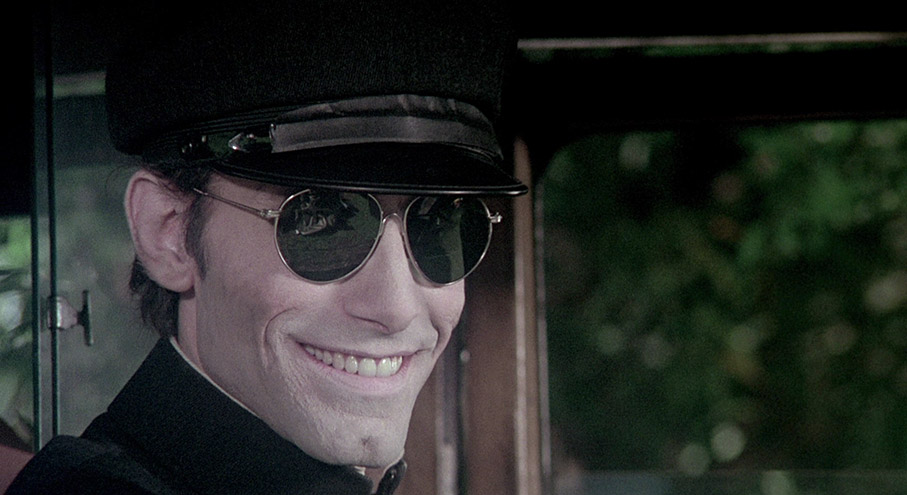
Ah, the smiling chauffeur. Despite occupying only a couple of minutes of screen time, it's he that those who saw the film on its cinema release most readily recall, usually with a shudder. With his eyes shielded by aviator sunglasses and a smile that seems to spread beyond the borders of his face, he never speaks nor does he make any explicit threats, but still somehow transforms the friendliest of facial gestures into an unforced expression of utter malevolence. It's an image that very much sums up the film's determination not to spell out what can be implicated or suggested – the man's true nature is never explained beyond the suggestion that he has stepped out of Ben's nightmares and into the real world. It's left to us to reason that he may be a physical embodiment of whatever dark forces are at work here, one that feeds on and takes shape from its victim's childhood traumas.
The inherent problem with this approach is that it allows and even invites audience speculation on the nature of the probable evil and gives them the time they need to formulate a theory or two and sit impatiently waiting for the characters to catch up. But when the revelation comes – which it does without horn-blasting fanfare or explicit explanation – it's intriguing enough a concept to completely change how you might view what has unfolded beforehand. Given that this is the element that differentiates Burnt Offerings from its sub-genre brethren I'm reluctant to say more, so was a little surprised on visiting the film's IMDb page to discover that this very twist has been included in the brief plot summary at the top of the page. Nice one, spoiler monkeys.
The cast is a key attraction here, and all get at least one opportunity to flex their acting chops. Oliver Reed may shake a little too uncontrollably as Ben when the chauffeur pays him a personal visit, but absolutely oozes menace when he bears down on David in the swimming pool like a malevolent shark, and the frustration bubbling beneath the surface when trauma robs him of his independence and machismo feels painfully real. I've no doubt that those who are still sniffy about horror will believe that a star of Bette Davis's magnitude was really slumming it as Aunt Elizabeth, but once her health begins to fail and death literally comes knocking at her bedroom door, she genuinely seems to have aged a good 20 years and had me wondering what she put herself through to look as terminally sick as she does here. Karen Black's shining moments are more low key but no less effective, with her creepily smiling acceptance of a situation that is emotionally destroying her husband topped by an extraordinary climactic transformation that is effected almost solely by expression, lighting and the single most expressive camera angle in the film. There's brief but entertaining support from old hands Eileen Heckart and Burgess Meredith as Roz and Arnold Allardyce, and while Anthony James is really only required to do one thing as the sinister chauffeur, he does it so perfectly that if there were an award for the most perfect piece of casting in the film, he'd win it by a mile.
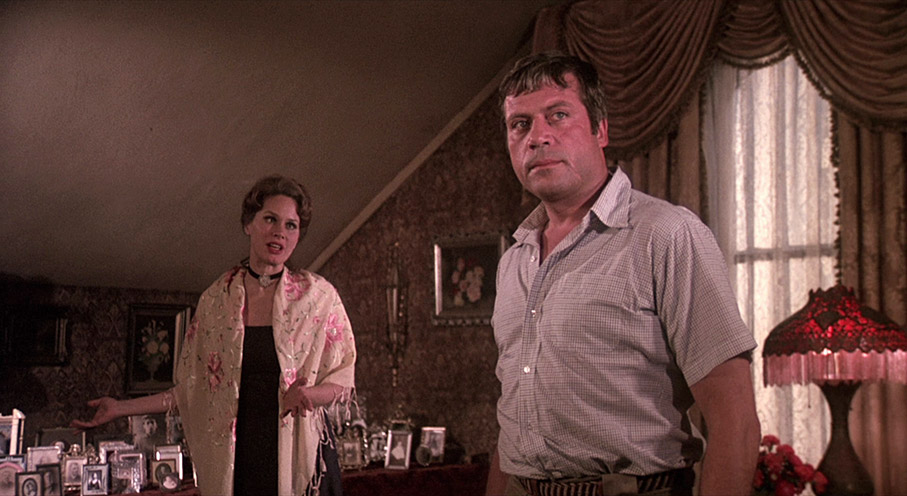
Director Curtis can't quite shake off the TV Movie aesthetic that he'd mastered by this point, but still creates an uneasy atmosphere from the off by shooting almost every scene looking at least slightly upwards, bringing ceilings into shot in a way the makes the house as much a character in the film as its human counterparts, which ties nicely into the central premise that I've gone to great pains to avoid revealing. This also subtly suggests that that we're seeing events partly from David's point of view, as he watches his father turn violent, his mother become distant and distracted, and his beloved aunt fall victim to sudden and inexplicable illness. For him, the horror is not abstract or supernatural, but the gradual collapse of everything he holds dear.
As American film horror has become louder, more derivative and more effects and jump-scare driven, it's actually refreshing to revisit a work as low-key and subtly effective as Burnt Offerings. It never sets out to shock or disturb, and yes, it can feel old-fashioned and even a little horror-light by those who expect genre films to launch an all-out assault their senses and morals, but give it a chance and it just might still surprise you. As much a study of the gradual disintegration of the family unit as a supernatural thriller, it has some interesting takes on established horror tropes, some real subtextual meat, and it even prefigures ideas and scenes from major genre works to come, including The Evil Dead and The Shining. It's a film I remember enjoying on its release, and for me it remains a creepily effective and rewarding work, one that kicks against tradition by having those fears that tend to lurk in the shadows play out in strangely sinister sunlight.
Depending on where you drop into the film, it's possible you might experience a slight twinge of disappointment when the transfer here doesn't feel quite as scalpel-sharp as you might be hoping. But don't be fooled by what was apparently a deliberate aesthetic choice. On the first commentary on this very disc, director Dan Curtis reveals that some of the film was shot using a diffusion filter, which slightly softens the image in a manner we used to use for wedding photography and romantic dramas – when the filter is not employed, the image is really crisp, and it's those shots that the transfer should be judged by. The contrast is generally on the nose throughout, the black levels are strong, the colours largely naturalistic if a tad faded in places and with a warmness to some interiors, and there's precious little sign of any previous dust or damage. Great job. The framing is the original 1.85:1.
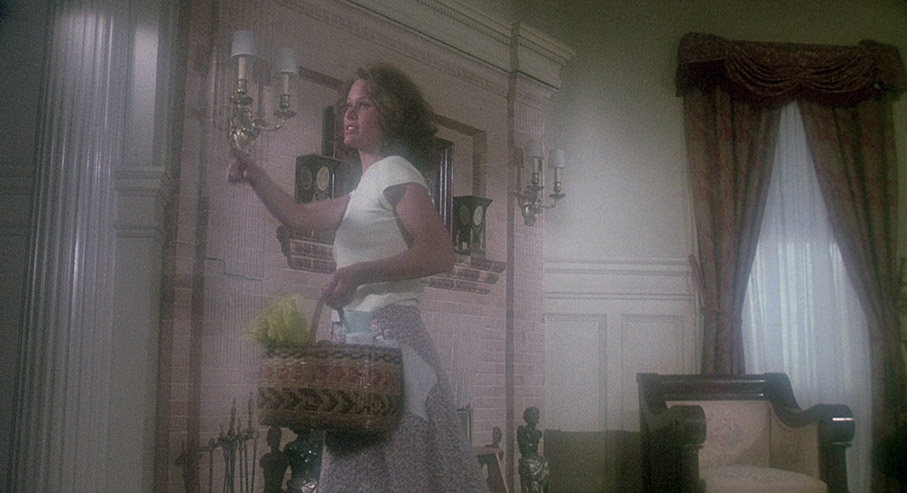
The Linear PCM 2.0 mono track is also in good shape, with clear rendering of dialogue and solid handling of Dan Curtis regular Bob Cobert's sometimes eerie score.
Optional English subs for the deaf and hard of hearing are also available.
Anthony James: Acting His Face (17:32)
The delightful Anthony James – who provides that memorable chauffeur smile, which Richard Harland Smith describes on his commentary track as "the film's best special effect" – talks about being repeatedly cast for his looks rather than what he might be able to bring to a part (hence the title of his autobiography, Acting My Face). He also discusses the role that luck has played in his career, his on-set friendship with Bette Davis on Burnt Offerings and Return From Witch Mountain, the development of his painting and the reasons for his current focus on abstract, the issues he had getting his memoirs published, and a whole lot more. There's a nice anecdote about being directed by Clint Eastwood in Unforgiven, and he has a wonderful philosophy on the process of artistic creation: "To create a work of art is to wrestle with the Angel of Death – you can never win, but how beautifully you can lose." I'm going to have that framed and put jit on my wall.
Blood Ties (16:28)
Actor Lee Montgomery, who plays young David in the film, discusses his memories of working on Burnt Offerings, just about all of which are positive ones. There are some great stories here, the best of which revolves around his desire to be part of Oliver Reed's entourage, who called themselves Reed's Raiders and even wore T-shirts to that effect – when Reed got him drunk on wine as part of the initiation into the group (Lee was just 14 at the time), his furious mother hunted Reed out and punched him in the face. Thoughtfully, there's a spoiler warning at the start, which I'd definitely heed if you've not seen the film.
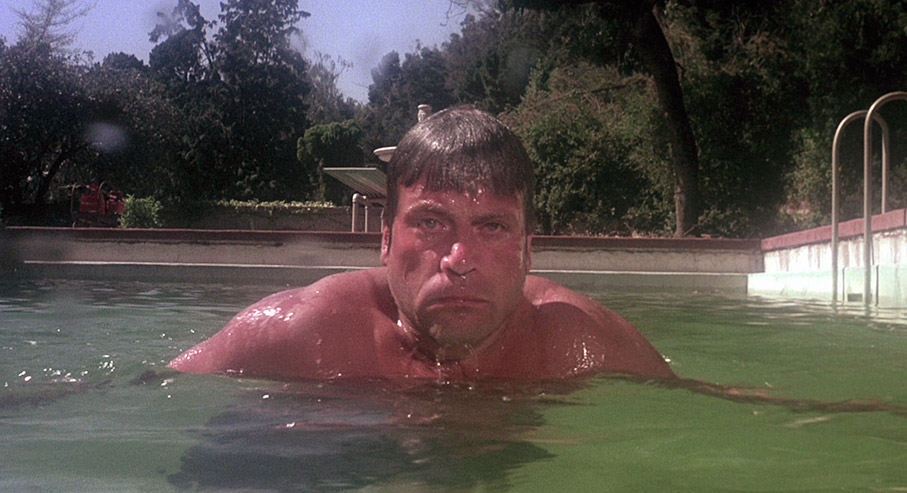
From the Ashes (13:20)
Screenwriter William F. Nolan discusses his association with director Dan Curtis and the process of adapting Robert Marasco's novel for the film. He usefully outlines the changes made to the book in bringing it to the screen, reveals that the pool scene was based on an actual incident involving a brain-diseased friend and his son, and gives an insight into one intended subtext of the film when he says, "The house is the symbol of security in our country, and when you remove security then you've gotten down to the raw nerve." He's also not the only one with stories of Bette Davis's intense dislike of Oliver Reed. This also has a spoiler warning up front.
Portraits of Fear (3:20)
An animated gallery of promotional material and behind-the-scenes stills, including covers for Morasco's novel, publicity shots, lobby cards and a nicely designed Japanese handbill.
Theatrical Trailer (2:28)
"Beyond this door lies a horror beyond imagination," the serious-voiced narration riskily assures us in this serviceable but unexceptional promo.
Audio Commentary by Dan Curtis, Karen Black and William F. Nolan
Recorded for an earlier DVD release (Dan Curtis died in 2006), this commentary covers a lot of ground, including how the project (eventually) came to be, Curtis's approach to camera placement (which, if I remember right, is similar to Roman Polanski's), how an incident at Curtis's mother's funeral helped give birth to Ben's nightmares and the grinning chauffeur, how Black hid her pregnancy during the shoot, audience reaction to the film, and more. Black sometimes chips in with observations that are completely divorced from the conversation taking place between Curtis and Nolan, and while the two men are clearly long-standing colleagues and friends, just occasionally Curtis responds to comments from Nolan with an audible whiff of exasperation, as if all that's missing is "for fuck's sake" at the end of his response. There are also a couple of abrupt switches to silence mid-sentence, suggesting content has been inexplicably censored.
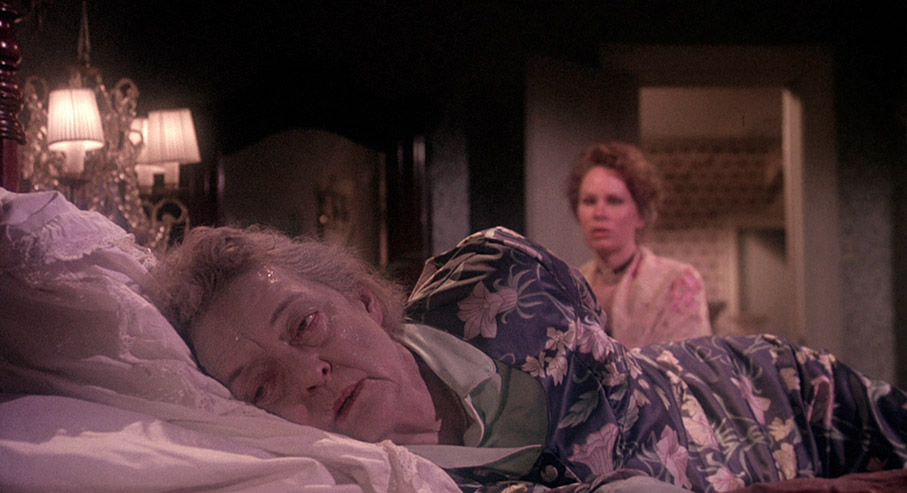
Audio Commentary by Richard Harland Smith
A newly recorded commentary by writer Richard Harland Smith of Video Watchdog and Movie Morlocks, one so packed with information and analysis that a transcript would probably fill a sizeable book. He finds links to a dizzying array of other seemingly unrelated movies – from Curse of the Cat People and Night of the Living Dead to Look Back in Anger and (seriously) National Lampoon's Vacation – goes into considerable detail about the changes made to Morasco's novel and the evolution of the haunted house movie, and talks about his own early attraction to the horror genre, contemporary critical reaction to the film, the careers of the actors and some of the filmmakers, and so much more. As a horror icon he also ranks the grinning chauffeur alongside The Tall Man from Phantasm and Freddie Krueger from A Nightmare on Elm Street. I'm with him on that. A marvellous track.
Also included with the first pressing is a collector's booklet featuring new writing on the film by critic Kat Ellinger, but we didn't get to see this.
Largely dismissed on its cinema release but now a cult favourite and held in far higher critical regard, Burnt Offerings is still a creepily effective sinister house movie built around an intriguing central concept, and boasts an impressive cast, solid direction and a handful of scenes and images that have stayed with me for years. A nice and frankly unexpected choice for an Arrow HD restoration, it looks great here and sports a very nicely collection of extras. Recommended.
|